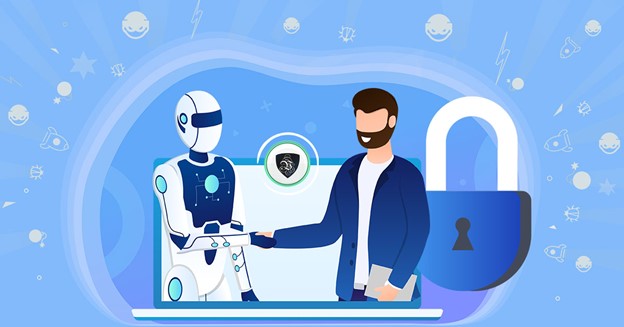Future Trends and Possibilities of AI and VPN – 2024
Future Trends and Possibilities of AI and VPN – 2024 Artificial Intelligence (AI) and Virtual Private Networks (VPNs) are rapidly evolving technologies in 2024 that are poised to impact the future of digital connectivity and security significantly. As AI capabilities advance, integrating this transformative technology with VPN infrastructure holds immense potential to revolutionize how we […]

future trends and possibilities of ai and vpn 2024
Future Trends and Possibilities of AI and VPN – 2024
Artificial Intelligence (AI) and Virtual Private Networks (VPNs) are rapidly evolving technologies in 2024 that are poised to impact the future of digital connectivity and security significantly.
As AI capabilities advance, integrating this transformative technology with VPN infrastructure holds immense potential to revolutionize how we approach online privacy, network performance, and cybersecurity. This article will explore the emerging trends and exciting possibilities that arise from the convergence of AI and VPN technology.
Additionally, we will discuss the possibilities of predictive analytics, advanced encryption techniques, and future trends and opportunities of AI and VPN.
The Future AI and VPN Technology
Predictive Analytics and Network Optimization
Integrating AI with VPN technology can enable predictive analytics, allowing VPNs to anticipate user behavior, network conditions, and potential threats.
This can lead to proactive optimization of network performance, intelligent load balancing, and enhanced security measures.
By leveraging AI-powered anomaly detection, VPNs can identify and mitigate cyber threats in real time, providing users with a more secure and reliable online experience.
Advanced Encryption and Privacy Protection
AI-driven VPNs can also explore the development of next-generation encryption algorithms and protocols. By utilizing machine learning, these VPNs can adapt advanced encryption techniques to stay ahead of security threats.
AI-driven Security Improvements
AI powered VPN can leverage machine learning algorithms to detect and mitigate advanced persistent threats, zero-day vulnerabilities, and other emerging cybersecurity challenges.
By continuously analyzing network traffic patterns and user behavior, these VPNs can adapt their security protocols to provide a more robust and dynamic defense against evolving threats.
Integrating AI and VPN technology can also enhance user experience through,
- Intelligent connection management
- Automated server selection
- Personalized recommendations (based on individual usage patterns).
This convergence can lead to seamless, optimized, secure connectivity for personal and enterprise-level applications. Enterprise VPNs are trying.
Threat Detection and Prevention
VPNs can integrate advanced threat detection with the power of Artificial Intelligence.
For example, corporate VPNs can use AI technology for advanced threat detection to detect cyberattacks and mitigate the issue automatically without human intervention.
Corporate VPNs can save money and reputation by preventing cyber-attacks with AI-driven threat detection and prevention. Many corporate VPNs are currently working on AI algorithms to find a way to utilize the power of AI in cybersecurity.
Intelligent Self Defense
Machine learning can be integrated into the VPN to develop a self-defense module.
VPNs can apply defensive measures to mitigate network threats and prevent VPN bypass, DNS posing, and uninstall prevention as self-defense.
This self-defense mechanism can also enable VPNs to adapt and evolve their security protocols in response to new threats, ensuring users maintain a secure and reliable connection.
Additionally, AI VPNs can leverage predictive analytics to anticipate potential vulnerabilities and implement countermeasures automatically. This will further enhance an organization’s overall cybersecurity stance, saving time and human involvement.
AI for Optimizing VPN Performance
AI can also optimize VPN performance by intelligently managing network traffic, balancing loads across servers, and providing personalized server recommendations to users. This can lead to faster, more reliable connections, reduced latency, and enhanced user experience.
Furthermore, AI-powered VPNs can adapt their configurations dynamically to ensure optimal performance and minimize the impact of network congestion or server outages.
Potential Challenges of Implementing AI In VPN
Security Vulnerability
Although AI integration can help prevent advanced threats, it can also create a door to unknown vulnerabilities in the system for hackers to exploit. Also, cybercriminals can develop reverse methodology to develop sophisticated AI to attack AI. Imagine AI vs AI!
Scalability Issues
AI systems must be capable of processing and analyzing large volumes of data quickly and efficiently. Ensuring that AI-enhanced VPNs perform well under high usage conditions can be a significant challenge and resource-intensive.
Possible Skill Gap
There is a growing demand for professionals skilled in AI and VPN technologies, and finding such talent can be difficult. Rapid advancements in AI and VPN technologies also require ongoing education and training for IT and security professionals.
Cost Implication
Integrating machine learning and training it to get the desired output is technically complex and challenging, which requires highly skilled people. Also, AI algorithms, API, datasets, and maintenance are needed computational resources, which is costly.
Closing Thoughts
As the usage and implications of Artificial Intelligence are increasing, many technologies are adopting it. Gradually, more industries will integrate machine learning into their services to enhance performance, usability, convenience, and security.
AI will also be able to detect suspicious activities, identify network weaknesses, and provide better access control for individuals and industries. This can help organizations protect their data and networks from the rising cyber threats.
Do follow please
Do follow please
